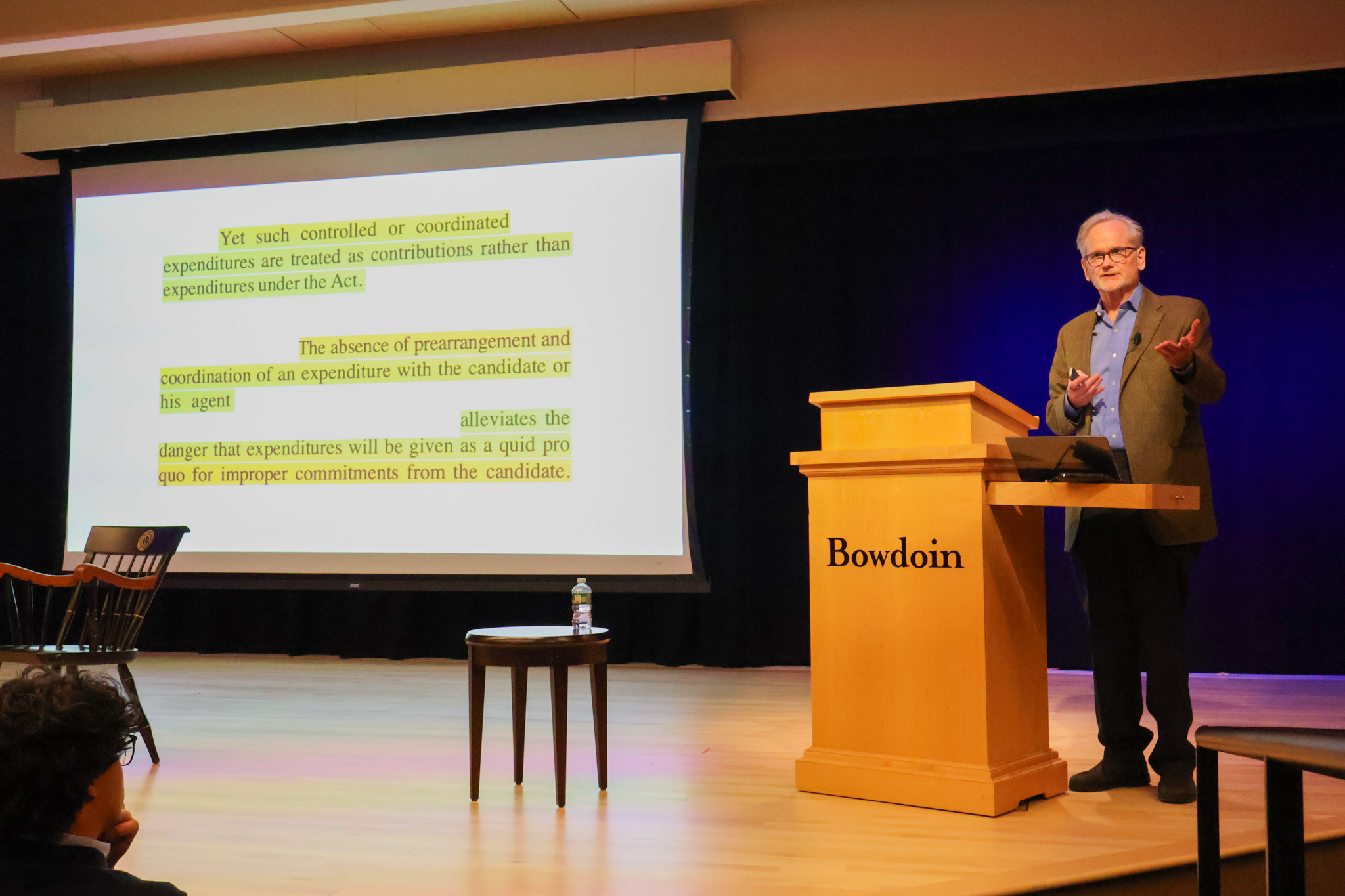Harvard Law professor Lawrence Lessig discusses the strategy for ongoing Maine campaign finance litigation
November 7, 2025
 Abigail Hebert
Abigail HebertLast Wednesday in Kresge Auditorium, professor of law at Harvard Law School Lawrence Lessig discussed ongoing litigation at the Court of Appeals for the First Circuit regarding campaign finance regulations. This litigation pertains to a 2024 Maine ballot initiative limiting campaign contributions that was passed by 75 percent of voters. This law was almost immediately challenged and ruled unconstitutional at the district court level. Lessig and the organization he founded, Equal Citizens, have appealed the decision.
Maia Cook, the executive director of Equal Citizens and one of Lessig’s former research assistants, began the talk by defining super political action committees (super PACs) and outlining their impact on the amount of money involved in political campaigns. Cook explained that the modern super PAC is a product of the Supreme Court case Citizens United v. FEC (2010), which deemed limits on independent expenditures uncoordinated with specific campaigns as unconstitutional, and the D.C. Circuit Court of Appeals case SpeechNow.org v. FEC (2010), which expanded the doctrine from Citizens United and deemed contribution limits to independent expenditure super PACs unconstitutional.
“Together, these decisions created the modern super PAC, a legally distinct type of political action committee that can receive unlimited sums from corporations, individuals and unions and can spend unlimited amounts so long as they are uncoordinated [with campaigns],” Cook said.
Cook stated that while the intersection of democracy and capitalism requires some amount of campaign finance, the modern super PAC has created a vast increase of money—especially anonymous donations, also called dark money—in politics. She also noted that unrestricted super PAC activity has disadvantaged both Democrats and Republicans, leading to both parties being exorbitantly influenced by the richest top one percent of Americans.
“I don’t want the scale here to be lost on anyone, because just in 15 years, dark [money] contributions went from $6.6 million to $1.3 billion, and that is a 197 times increase from its original size,” Cook said.
Lessig outlined the legal theory that could reform elections to be less influenced by super PACs and billionaire spending. Citizens United built off of the Supreme Court case Buckley v. Valeo (1976), which stated that if expenditures from independent organizations are not prearranged with those running for office, there is no real or apparent corruption and thus these donations cannot be limited. Under Buckley, if expenditures are coordinated between organizations and candidates, they can be regulated. Citizens United expanded this principle to corporations and unions. The SpeechNow decision established that contributions to these expenditures also create no corruption or appearance of corruption, a decision that Lessig takes issue with. He explained that while independent expenditures cannot be prearranged or coordinated, contributions can.
“It’s totally legal for [a candidate] to coordinate contributions to his super PAC, even though he is regulated not to coordinate expenditures. So the fact that contributions can be coordinated means the whole premise behind equating contributions with expenditures is just false,” Lessig said.
Lessig and Equal Citizens will be using this theory to argue the case for Maine’s ballot initiative in the Court of Appeals. In district court, the judge ruled that even if there is real or apparent corruption, Maine has no right to regulate it.
“The reason that’s a great victory is that that is the most extreme any court has ever been,” Lessig said. “It’s the first court in the history of federal jurisdiction ever to hold that even though there’s a risk of corruption, there’s nothing you can do about it.”
Lessig argued that, because of this extremity, if the Court of Appeals or Supreme Court rules against Equal Citizens, it will be a betrayal of the existing law.
“You only see how bad it would be if they struck the Maine initiative down by seeing how clear it is that the Maine initiative is constitutional.… If the court goes against us now, it is an extraordinary betrayal.… They’re changing the law to protect super PACs, not upholding Citizens United but extending Citizens United for the first time,” Lessig said.
Lessig believes that an extension of Citizens United would present a real political crisis, necessitating a bravery amongst lawyers, universities and the press.
“As we look around at this moment, there’s a certain cowardice that has become contagious. People make a judgment about what they should do, and they do the reasonable thing. And the reasonable thing is an act of cowardice,” Lessig said. “It’s understandable why they do what they do. It’s also wrong.”
Ultimately, Lessig is hopeful that the Supreme Court will agree with Equal Citizens. However, he also argues that should the Court disagree, it will be a sign for a necessary reform to the United States’ political structures.
“I’m optimistic the Court will agree with me. I think we should realize just what’s at stake if the Court goes the other way,” Lessig said in an interview with the Orient. “We need to start thinking seriously about how we bring constitutional reform through this process that involves citizens as opposed to lawyers and politicians.”
Attendee Gigi Ford ’27 admired Lessig’s ability to explain legal issues and theory in a concise and accessible manner.
“The most impactful part of the talk was Lessig explaining the logical fallacies found in the judicial system’s reasoning and practice. Being able to communicate this effectively to someone without a background in law is very important in the fight for ending super PACs,” Ford said.

Comments
Before submitting a comment, please review our comment policy. Some key points from the policy: